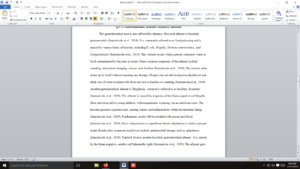Microbiology
Module 06 Homework Assignment
Use the information presented in the module folder along with your readings from the textbook to answer the following questions.
1. Differentiate between bacterial infection and bacterial intoxication.
2. Discuss the importance of E. coli as part of our intestinal flora.
3. Describe three (3) different types of gastrointestinal diseases caused by bacteria. Be sure to give the name of the specific organism that causes each, describe some common signs and symptoms and discuss treatment for each disease:
4. Define meningitis. Compare and contrast between bacterial and viral meningitis including treatment for each
5. What is a prion? Describe the impact prions have on the human brain and discuss two prion-associated diseases in humans: 6. What is a vector-borne (vector transmitted) disease? Give an example of a vector borne disease and the vector responsible for causing it:
apa format and referencing is highly recommended
Requirements: 3 pages
Answer preview
The gastrointestinal tract is also affected by ailments. One such ailment is bacterial gastroenteritis (Santonicola et al., 2019). It is commonly referred to as food poisoning and is caused by various forms of bacteria, including E. coli, Shigella, Yersinia enterocolitica, and Campylobacter (Santonicola et al., 2019). This disease occurs when a person consumes water or food contaminated by bacteria or toxins. Some common symptoms of the ailment include vomiting, abdominal cramping, nausea, and diarrhea (Santonicola et al., 2019). The ailment often clears up by itself without requiring any therapy. Despite this, an infected person should rest and drink lots of water to replace the fluid lost due to diarrhea or vomiting (Santonicola et al., 2019). Another gastrointestinal ailment is Shigellosis, commonly referred to as bacillary dysentery (Santonicola et al., 2019). The ailment is caused by 4 species of the Gram-negative rod Shigella.
[1352 Words]

Microbiology

